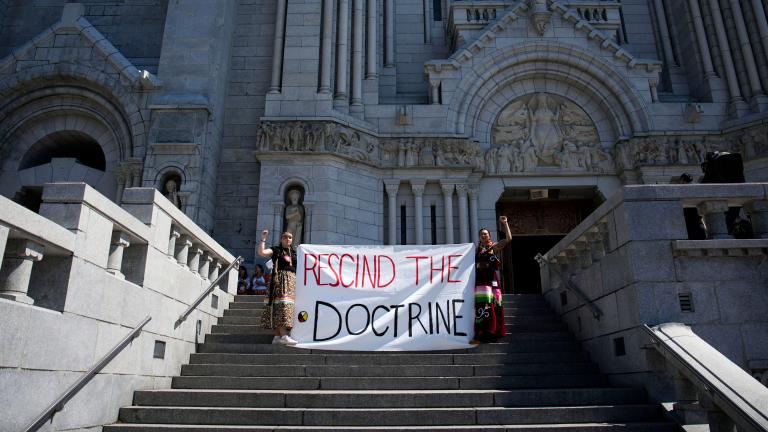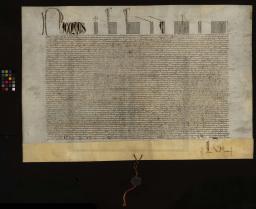The Doctrine of Discovery is a legal and religious concept that has been used for centuries to justify Christian colonial conquest. It advanced the idea that European peoples, culture and religion were superior to all others.
The Doctrine of Discovery
A 500-year-old colonial idea that still affects Canada’s treatment of Indigenous peoples
By Travis Tomchuk
Published: November 2, 2022 Updated: May 11, 2023
Tags:

Photo: AP Photo, John Locher
Story text
The Doctrine of Discovery was set out in a series of declarations by popes in the 15th century. These declarations (known as “papal bulls”) provided religious authority for Christian empires to invade and subjugate non‐Christian lands, peoples and sovereign nations, impose Christianity on these populations, and claim their resources. These papal bulls were written at a time when European empires were embarking on widescale colonial expansion.

Why is it important?
The Doctrine of Discovery is still an important legal concept in Canada today even though it was written hundreds of years ago. Both French and English colonial powers in what would later be known as Canada used the Doctrine of Discovery to claim Indigenous lands and force their cultural and religious beliefs on Indigenous peoples. Once Canada was created, the Doctrine of Discovery influenced the imposition of national, colonial laws on Indigenous peoples. This is because it denies the validity of longstanding systems of Indigenous governance and sovereignty.
The Doctrine of Discovery and human rights
In the Canadian context, the Doctrine of Discovery has led to the seizure of Indigenous lands and the displacement of Indigenous peoples. As colonial settlement spread over the territory that became Canada, many Indigenous peoples entered treaty relationships defining how they would share the land with the newcomers. Influenced by the absolute claims to power and authority expressed by the Doctrine, Canadian law interpreted these agreements as surrendering title and control, despite these concepts being largely alien to Indigenous cultures.
The Canadian government has also claimed title and control over unceded Indigenous lands. This was demonstrated in the 2014 Supreme Court of Canada ruling in Tsilhqot’in Nation v. British Columbia.[3] The ruling found that the Tsilhqot’in had indeed demonstrated their Aboriginal title to their land. This meant that they had "an exclusive right to use or occupy the land for the nation’s collective benefit."[4]
However, the ruling also said that Aboriginal title could be defied by the Crown (either the provincial or federal governments) if it could justify such action.
The racist assumption of superiority and dominance embodied in the Doctrine of Discovery underpins many aspects of Canada’s colonial history, including the Indian Act, the reserve system, the Indian residential school tragedy, and the Sixties Scoop.

Calls for the Doctrine of Discovery to be rescinded
During Pope Francis' 2022 visit to Canada to apologize for the Catholic Church’s role in Canada’s residential schools, there were calls from Indigenous people for the pope to rescind the Doctrine of Discovery. Kate Gunn, a partner at the law firm First Peoples Law, stated that this would be an "important way of beginning to acknowledge the way the Doctrine has been used as a tool to justify the dispossession of Indigenous peoples from their lands for centuries, and beyond that as a tool for enabling cultural genocide in the form of residential schools."[4]
Repudiation of the Doctrine
In March 2023, the Vatican officially repudiated the Doctrine of Discovery. In a statement,[5] the Vatican admitted that the papal bulls on which the doctrine is based "did not adequately reflect the equal dignity and rights of indigenous peoples." The statement denied that the Doctrine of Discovery was a teaching of the Catholic Church and claimed that these documents had been "manipulated for political purposes" by colonial empires to justify their treatment of Indigenous people. The Vatican also acknowledged the importance of Indigenous voices in addressing the Doctrine of Discovery.
The Vatican statement on the Doctrine of Discovery was generally received as a positive first step by some Indigenous groups and representatives. However, many pointed out that the statement stopped short of rescinding the papal bulls – Dum Diversas (1452), Romanus Pontifex (1455) and Inter Caetera (1493) – on which the doctrine is based.
What does the Vatican's statement mean in the Canadian context? Tamara Baldhead Pearl, who is from One Arrow First Nation and an assistant professor of law at the University of Alberta, believes the repudiation of the doctrine may not lead to significant changes to Canadian law. "But," she says "it will have a significant impact on those who make changes in the law, so that we distance ourselves from the Doctrine of Discovery and use the treaties [and] the nation‐to‐nation relationship that we had, as confirmed by the Royal Proclamation of 1763, as the foundation of our relationship here in Canada."[6]
Ask yourself:
How might rescinding the Doctrine affect the government’s relationship with Indigenous peoples?
What old colonial ideas and racist stereotypes continue to influence us in Canada today?
Where and how did you learn about the history of colonization in Canada?
Explore more stories
Indigenous history and human rights
Discover the stories of Indigenous people and communities. Learn about Canada's history of colonialism and genocide. Reflect on how we can collectively work towards reconciliation.

References
- The Bull Romanus Pontifex (Nicholas V), January 8, 1455. https://caid.ca/Bull_Romanus_Pontifex_1455.pdf. Back to citation 1
- "Papal Bull ‘Romanus Pontifex' of Pope Nicholas V, by which he granted to King Dom Afonso V and to Prince Henry the Navigator, and to all the kings of Portugal and their successors, all the conquests of Africa with the islands in the seas adjacent to it, from Cape Bojador and No and the entire coast of Guinea, and that they may order the construction of churches in them, whose patronage shall remain with him." Bulas, mç. 7, no. 29 PT/TT/BUL/0007/29. Image courtesy of the ANTT. Back to citation 2
- Supreme Court of Canada, Tsilhqot'in Nation v. British Columbia, Case no. 34986, 26 June 2014, https://scc-csc.lexum.com/scc-csc/scc-csc/en/item/14246/index.do. Back to citation 3
- Brett Forester, "Doctrine of Discovery is a 'legal fiction,' but revoking it won’t herald immediate changes, experts say," APTN, 29 July 2022, https://www.aptnnews.ca/national-news/doctrine-of-discovery-is-a-legal-…. Back to citation 4
- The Holy See, "Joint Statement of the Dicasteries for Culture and Education and for Promoting Integral Human Development on the "Doctrine of Discovery", March 30, 2023, https://press.vatican.va/content/salastampa/en/bollettino/pubblico/2023…. Back to citation 5
- Paul Hantiuk, "How Canadian law could change with the Vatican repudiation the Doctrine of Discovery," CBC Radio, April 8, 2023, https://www.cbc.ca/radio/day6/doctrine-discovery-canadian-law‑1.6805472 Back to citation 6
Suggested citation
Suggested citation : Travis Tomchuk. “The Doctrine of Discovery.” Canadian Museum for Human Rights. Published November 2, 2022. Updated: May 11, 2023. https://humanrights.ca/story/doctrine-discovery